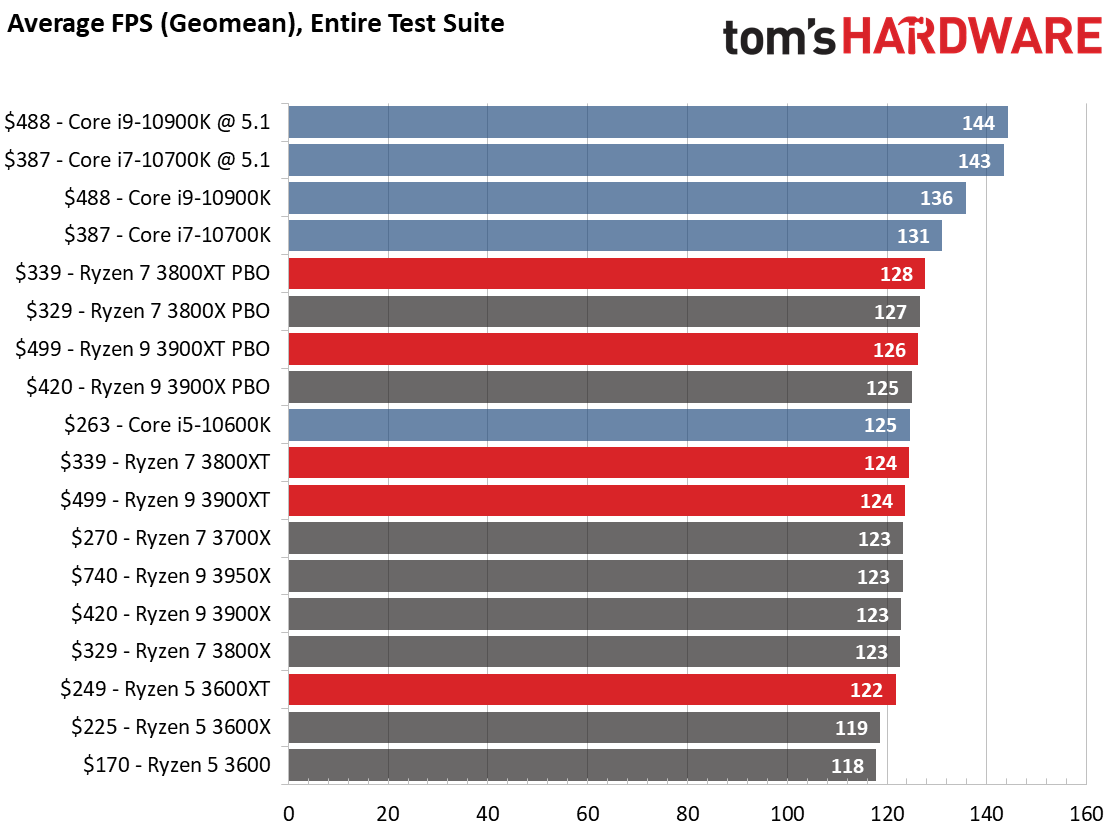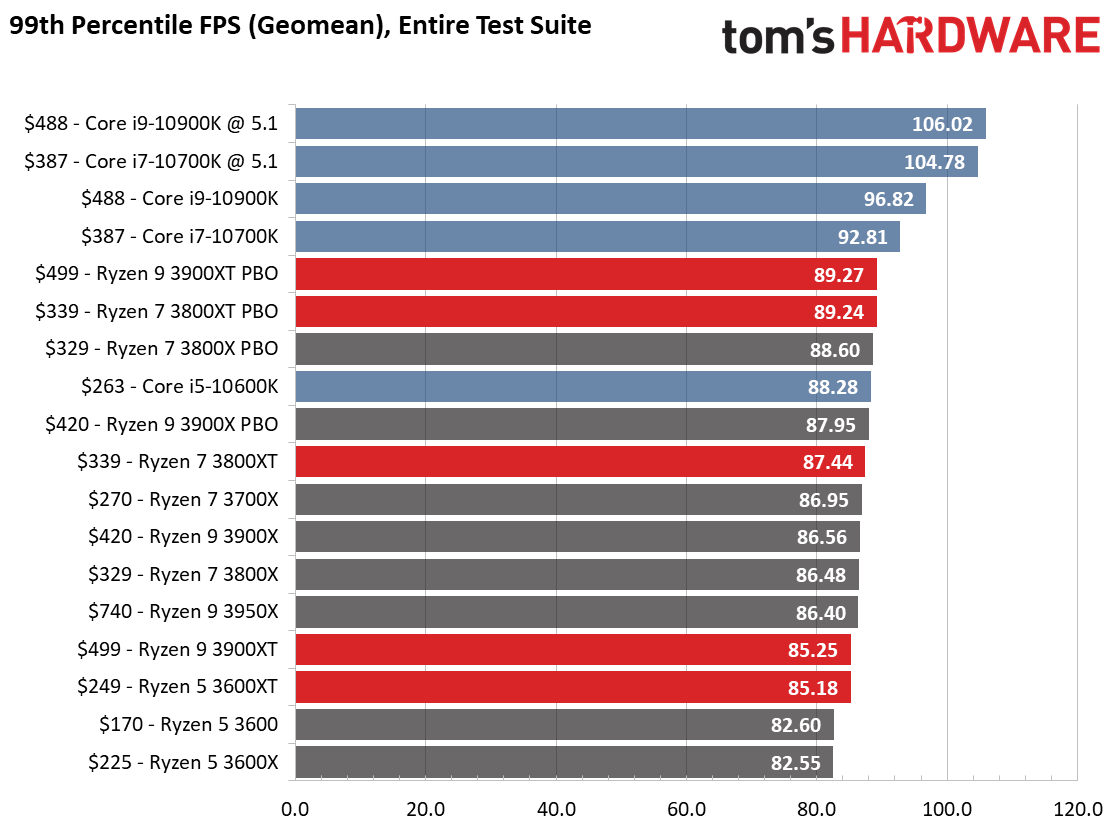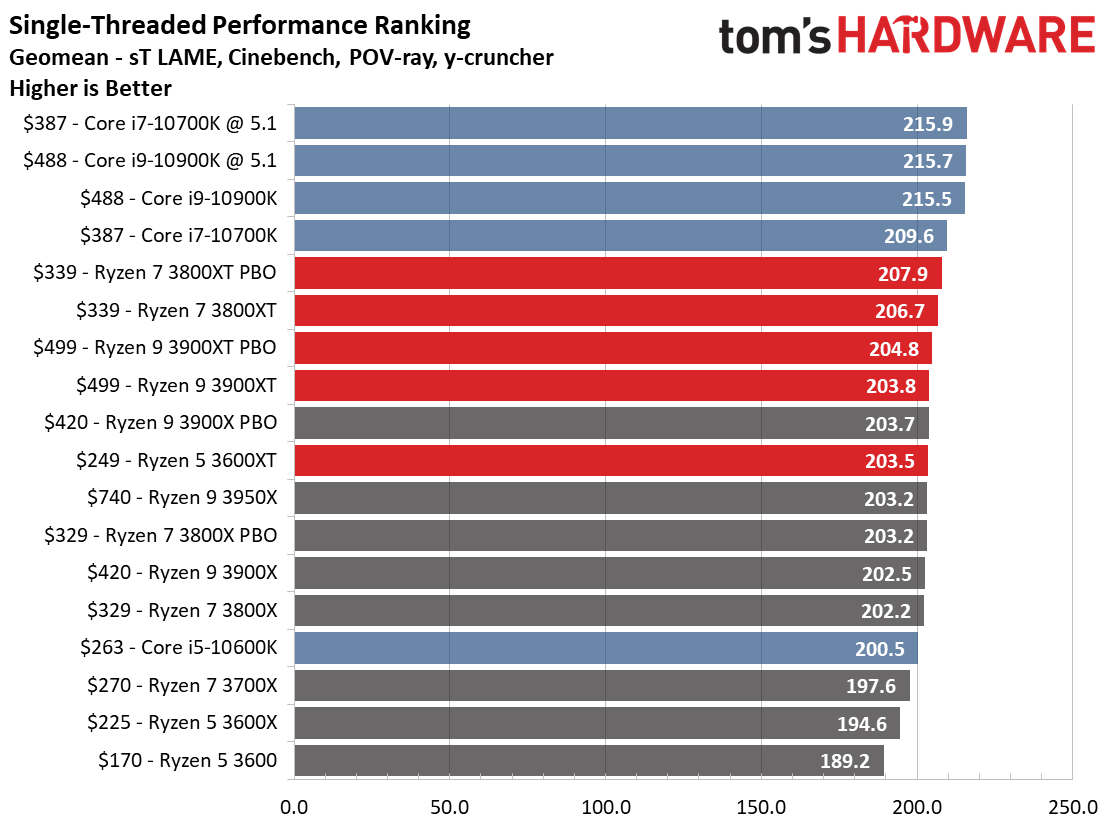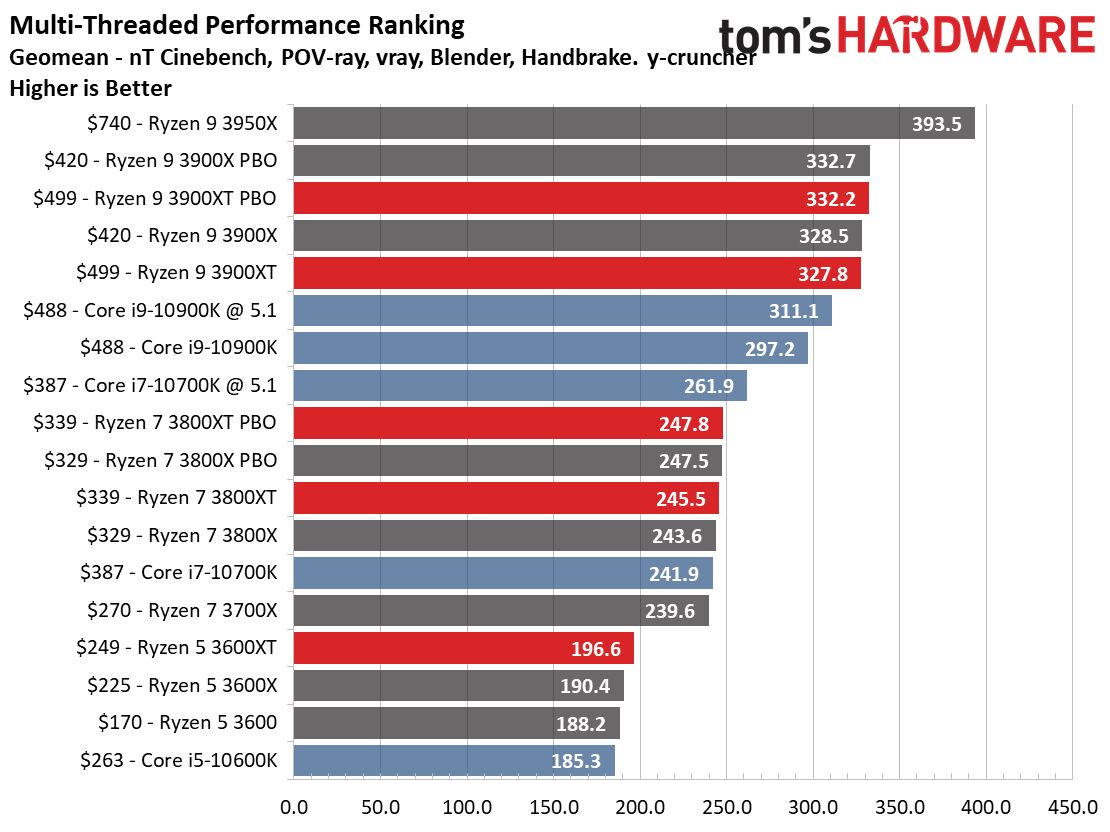Why you can trust Tom's Hardware
The Ryzen XT lineup arrives to do battle with Intel's Comet Lake, but while the new chips do provide measurable performance gains over their predecessors, you'll need to run very specific workloads to justify the increased costs associated with the cooler-less Ryzen 9 3900XT and Ryzen 7 3800XT. That's complicated by the fact that the existing X-series models already retail at great price points, giving AMD plenty of competition from within its own ranks.
The Ryzen 5 3600XT looks promising if it falls to a lower price point, especially in light of its bundled cooler, but we'll follow up with more targeted testing in a separate review.
There are places where the 3900XT and 3800XT might make sense despite their higher pricing, but for the majority of enthusiasts, gaming isn't one of them. In the chart below, we plot gaming performance using average frame rates and a geometric mean of the 99th percentile frame times (a good indicator of smoothness), which we then convert into a frames-per-second measurement. Bear in mind that we tested with an Nvidia GeForce RTX 2080 Ti at 1920x1080 to alleviate graphics-imposed bottlenecks. Differences between our test subjects shrink at higher resolutions.




The 3900XT and 3800XT do little to meaningfully improve gaming performance over the X-series. Admittedly, our test suite isn't weighted heavily towards games that respond best to higher frequencies. AMD also cites DirectX 9 titles as particularly apt to see performance gains, but that isn't a very frequently-used API in 2020, so we don't have any DX9 titles in our suite.
AMD predicts a 2% increase in gaming performance over the X-series models for the 3900XT and 4% for the 3800XT, but we measured roughly 1% for both chips across the breadth of our test suite. We recorded slightly larger gains of 2.5% for the Ryzen 5 3600XT over the 3600X, but that delta might be impacted by our testing with the H115i cooler for both chips, so we'll follow up with targeted testing with the stock coolers.
If you're specifically looking for gaming performance, skip the $499 3900XT and $339 3800XT unless they drop to a much lower price point that's comparable to the X-series. AMD's recommended pricing rarely lasts at retail, particularly after a few months, so it's hard to determine where final pricing will land. Conversely, the X-series models carry the same MSRP but rarely command those prices at check out, and they could see further discounts, too. That muddies the waters in terms of firm recommendations.
If gaming is your primary focus, you'll be better served with less expensive Ryzen alternatives, like the Ryzen 7 3700X or the Ryzen 5 3600X that currently retail for $270 and $249, respectively. Those chips come with bundled coolers that can save you money on an aftermarket cooler, and they offer the lion's share of XT's performance at far lower price points. Intel's ~$275 Core i5-10600K is also a solid gaming option that currently leads our list of Best CPUs.
Get Tom's Hardware's best news and in-depth reviews, straight to your inbox.
We run a broad spate of applications that span from the mundane to the professional. Still, we didn't record many outstanding performance gains that justify the 3900XT and 3800XT's pricing (or lack of bundled coolers) for most day-to-day desktop PC applications. The chips are measurably faster in some tests, but in many cases, the deltas are slight and fall close to the standard deviation of the benchmarks.
Our frequency measurements exposed strong potential with the 3900XT and 3800XT's single-threaded boost clocks, but real-world testing didn't register as much of a benefit. Motherboard and firmware differences can have an impact, but the X570 platform is fairly mature, and any big advances on the optimization front will likely benefit the X-series models, too.
We did see slightly improved performance with the auto-overclocking PBO feature, but gains remain small and AMD says we shouldn't expect higher frequencies from manual overclocking, either.
Performance in the Puget Sound Adobe benchmark suite was by far the highlight of our testing, and it's clear that XT's performance optimizations benefit those types of mid-threaded workloads. If you're already planning on buying an aftermarket cooler, the Ryzen 3900XT and 3800XT make a good fit for those types of applications. Time is money for professionals and semi-pro creators alike, and those users will benefit most from the advantages the XT series bring to the table.
Overall, the Ryzen XT series does provide another option for discerning shoppers that know their workload, particularly those that frequently use applications that benefit. Still, most will be better served with AMD X-series processors or Intel alternatives.
MORE: Best CPUs
MORE: Intel and AMD Processor Hierarchy
MORE: All CPUs Content
Current page: The Rare Few
Prev Page AMD Ryzen 9 3900XT SPEC Workstation and Adobe Performance
Paul Alcorn is the Editor-in-Chief for Tom's Hardware US. He also writes news and reviews on CPUs, storage, and enterprise hardware.
-
jimmysmitty ReplyInvalidError said:AMD micro-binning the hell out of Zen 2.
I find it interesting yet expected. Both do this when they can. It also makes sense to remove the cooler, although Intel got hell for it, with a CPU thats designed for higher performance. Most people who build a system with top end CPUs tend to buy a third party cooler anyways and it just becomes more waste. -
King_V (sarcasm)Reply
AMD has been listening to the Intel fanboys on the forums. Higher clocks are all that matter. Included coolers are always stupid, because nobody will use them.
So, AMD offered just such an option. Ergo, having catered to what the Intel fanboys wanted, I obviously expect to see them snapping up Ryzen XT processers en-masse
(/sarcasm) -
InvalidError Reply
Part of that "hell" is for charging more despite removing the stock HSF which is in itself already an intrinsic value loss. If I'm going to get negative value for my money from ditching the stock HSF, I'll take the stock HSF even if I have no plan to actually use it.jimmysmitty said:It also makes sense to remove the cooler, although Intel got hell for it, with a CPU thats designed for higher performance. -
jimmysmitty ReplyInvalidError said:Part of that "hell" is for charging more despite removing the stock HSF which is in itself already an intrinsic value loss. If I'm going to get negative value for my money from ditching the stock HSF, I'll take the stock HSF even if I have no plan to actually use it.
They did the same thing here though.
But still the mass majority would throw the HSF away creating waste. Not worth it IMO. -
InvalidError Reply
You can flip the Prism on eBay for ~$35.jimmysmitty said:But still the mass majority would throw the HSF away creating waste. Not worth it IMO.